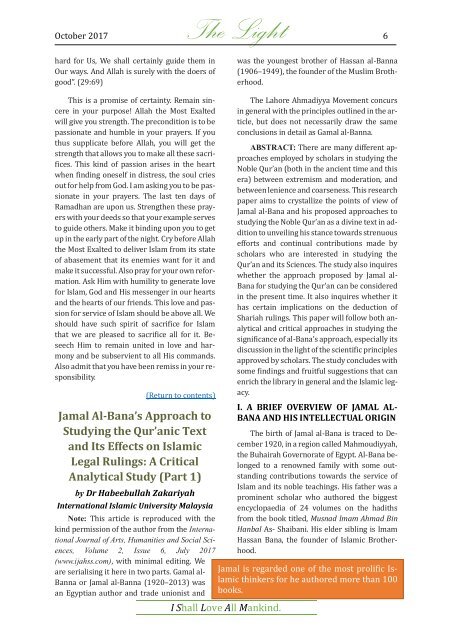The Light English edition October 2017
Organ of the Ahmadiyya Anjuman Ishaat Islam of Lahore popularly known as The Lahore Ahmadiyya Movement. The only organisation which believes in the finality of prophethood. Preaching Islam as in the Holy Quran and as taught by the Holy Prophet Muhammad (s) - rational, peaceful, scientific, inclusive.
Organ of the Ahmadiyya Anjuman Ishaat Islam of Lahore popularly known as The Lahore Ahmadiyya Movement. The only organisation which believes in the finality of prophethood. Preaching Islam as in the Holy Quran and as taught by the Holy Prophet Muhammad (s) - rational, peaceful, scientific, inclusive.
You also want an ePaper? Increase the reach of your titles
YUMPU automatically turns print PDFs into web optimized ePapers that Google loves.
<strong>October</strong> <strong>2017</strong> <strong>The</strong><br />
<strong>Light</strong> 6<br />
hard for Us, We shall certainly guide them in<br />
Our ways. And Allah is surely with the doers of<br />
good”. (29:69)<br />
was the youngest brother of Hassan al-Banna<br />
(1906–1949), the founder of the Muslim Brotherhood.<br />
This is a promise of certainty. Remain sincere<br />
in your purpose! Allah the Most Exalted<br />
will give you strength. <strong>The</strong> precondition is to be<br />
passionate and humble in your prayers. If you<br />
thus supplicate before Allah, you will get the<br />
strength that allows you to make all these sacrifices.<br />
This kind of passion arises in the heart<br />
when finding oneself in distress, the soul cries<br />
out for help from God. I am asking you to be passionate<br />
in your prayers. <strong>The</strong> last ten days of<br />
Ramadhan are upon us. Strengthen these prayers<br />
with your deeds so that your example serves<br />
to guide others. Make it binding upon you to get<br />
up in the early part of the night. Cry before Allah<br />
the Most Exalted to deliver Islam from its state<br />
of abasement that its enemies want for it and<br />
make it successful. Also pray for your own reformation.<br />
Ask Him with humility to generate love<br />
for Islam, God and His messenger in our hearts<br />
and the hearts of our friends. This love and passion<br />
for service of Islam should be above all. We<br />
should have such spirit of sacrifice for Islam<br />
that we are pleased to sacrifice all for it. Beseech<br />
Him to remain united in love and harmony<br />
and be subservient to all His commands.<br />
Also admit that you have been remiss in your responsibility.<br />
(Return to contents)<br />
Jamal Al-Bana’s Approach to<br />
Studying the Qur’anic Text<br />
and Its Effects on Islamic<br />
Legal Rulings: A Critical<br />
Analytical Study (Part 1)<br />
by Dr Habeebullah Zakariyah<br />
International Islamic University Malaysia<br />
Note: This article is reproduced with the<br />
kind permission of the author from the International<br />
Journal of Arts, Humanities and Social Sciences,<br />
Volume 2, Issue 6, July <strong>2017</strong><br />
(www.ijahss.com), with minimal editing. We<br />
are serialising it here in two parts. Gamal al-<br />
Banna or Jamal al-Banna (1920–2013) was<br />
an Egyptian author and trade unionist and<br />
I Shall Love All Mankind.<br />
<strong>The</strong> Lahore Ahmadiyya Movement concurs<br />
in general with the principles outlined in the article,<br />
but does not necessarily draw the same<br />
conclusions in detail as Gamal al-Banna.<br />
ABSTRACT: <strong>The</strong>re are many different approaches<br />
employed by scholars in studying the<br />
Noble Qur’an (both in the ancient time and this<br />
era) between extremism and moderation, and<br />
between lenience and coarseness. This research<br />
paper aims to crystallize the points of view of<br />
Jamal al-Bana and his proposed approaches to<br />
studying the Noble Qur’an as a divine text in addition<br />
to unveiling his stance towards strenuous<br />
efforts and continual contributions made by<br />
scholars who are interested in studying the<br />
Qur’an and its Sciences. <strong>The</strong> study also inquires<br />
whether the approach proposed by Jamal al-<br />
Bana for studying the Qur’an can be considered<br />
in the present time. It also inquires whether it<br />
has certain implications on the deduction of<br />
Shariah rulings. This paper will follow both analytical<br />
and critical approaches in studying the<br />
significance of al-Bana’s approach, especially its<br />
discussion in the light of the scientific principles<br />
approved by scholars. <strong>The</strong> study concludes with<br />
some findings and fruitful suggestions that can<br />
enrich the library in general and the Islamic legacy.<br />
I. A BRIEF OVERVIEW OF JAMAL AL-<br />
BANA AND HIS INTELLECTUAL ORIGIN<br />
<strong>The</strong> birth of Jamal al-Bana is traced to December<br />
1920, in a region called Mahmoudiyyah,<br />
the Buhairah Governorate of Egypt. Al-Bana belonged<br />
to a renowned family with some outstanding<br />
contributions towards the service of<br />
Islam and its noble teachings. His father was a<br />
prominent scholar who authored the biggest<br />
encyclopaedia of 24 volumes on the hadiths<br />
from the book titled, Musnad Imam Ahmad Bin<br />
Hanbal As- Shaibani. His elder sibling is Imam<br />
Hassan Bana, the founder of Islamic Brotherhood.<br />
Jamal is regarded one of the most prolific Islamic<br />
thinkers for he authored more than 100<br />
books.














